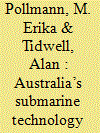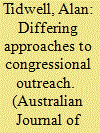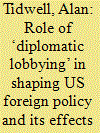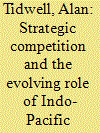|
|
|
Sort Order |
|
|
|
Items / Page
|
|
|
|
|
|
|
| Srl | Item |
| 1 |
ID:
139989


|
|
|
|
|
| Summary/Abstract |
Australia, Japan and the USA are all facing dual pressures that require them to do more with less. Internationally, they deal with the challenge of managing China’s rapid rise. However, domestically, they must cut government spending and reduce government debt. With internal balancing effectively ruled out as a long-term solution, the three states are seeking ways to optimise external balancing, or cooperation with like-minded states. This article focuses on Australian motivations regarding the recent proposal for submarine cooperation with Japan, and places it in the context of longer trends that poise the USA, Australia and Japan for even greater trilateralism in the future. Australia’s proposal to buy submarines from Japan, should it go through, would cement Australia and Japan’s fledgling security relationship in steel and coin. For Australia, it would help it to overcome its undersea capability gap, and Japan could set a precedent to re-enter the global weapons market if all goes well. Furthermore, Australia can use defence-technology cooperation with Japan to signal to the USA the seriousness of its commitment to burden-share in pursuit of regional security and determination to politically support the USA’s ‘Pivot’ to the Asia-Pacific. However, domestic politics have begun to play an important role in Australia, with a ‘spill’ motion against Prime Minister Tony Abbott barely overcome by a backroom deal with the opposition to build the submarines domestically, and this is an important development to keep an eye on.
|
|
|
|
|
|
|
|
|
|
|
|
|
|
|
|
| 2 |
ID:
160941


|
|
|
|
|
| Summary/Abstract |
Both Australia and New Zealand, in addition to engaging with the US executive branch, also protect and advance their bilateral relationship by engaging with the US Congress. Since 1987, Australia has pursued congressional outreach, or diplomatic lobbying, to protect and advance its security and trade interests. As a result, Australia has won both security and trade benefits. New Zealand's congressional outreach, on the other hand, has had a more challenging task of improving bilateral relations due, in part, to US objections to New Zealand's anti-nuclear policy. This article extends existing research on Australian and New Zealand congressional outreach, develops a framework for examining embassy-based congressional outreach and, through comparative analysis of Australian and New Zealand congressional outreach, gives greater insight into the nature and character of their efforts on Capitol Hill.
|
|
|
|
|
|
|
|
|
|
|
|
|
|
|
|
| 3 |
ID:
152000


|
|
|
|
|
| Summary/Abstract |
Lobbying as a form of engagement with the US Congress has long been studied from a domestic perspective. Lobbying, however, is not a practice confined to actors with domestic interests—it is also used as a form of diplomacy by many foreign governments, including Australia. Diplomatic lobbying is a vastly understudied phenomenon and its impact on US foreign relations is rarely examined. Unlike most Westminster-based democracies, the USA has two branches directly involved with foreign affairs—the Executive and Congress—each of which is important for different aspects of foreign policy development. Australia has found lobbying the US Congress to be a powerful tool for diplomatic engagement. This article looks at the role of the US Congress in foreign affairs, the effects of lobbying, and the ways in which diplomats engage with and lobby Congress. Australia’s specific lobbying efforts and their effects on the US–Australia relationship are then examined.
|
|
|
|
|
|
|
|
|
|
|
|
|
|
|
|
| 4 |
ID:
183367


|
|
|
|
|
| Summary/Abstract |
Scholarship on paradiplomacy, or sub-national diplomacy, has often focused on economics, trade, cooperation and politics. The deepening of strategic competition between the People’s Republic of China and the United States has raised the stakes for sub-national diplomacy. While US-PRC strategic competition occurs primarily at the national level, the subnational level plays an important role in terms of creating opportunities for influence and advancing the strategic interests. In this article recent paradiplomacy in the Indo-Pacific is examined, as is the is the intersection of paradiplomacy with strategic competition.
|
|
|
|
|
|
|
|
|
|
|
|
|
|
|
|
| 5 |
ID:
173154


|
|
|
|
|
| Summary/Abstract |
Amidst the cacophony of the Trump presidency, is it possible to unearth the logic behind his foreign policy? Do his strategy and tactics stem from him or are they a response to the changing international structure? This article addresses these questions and seeks to evaluate the Trump administration’s foreign policy record on its own terms by examining his methods and objectives through three frames: ‘Art of the Deal’, ‘Make America Great Again’, and ‘Stable Genius’. By applying these frameworks to three cases: (1) migration, (2) NATO funding and (3) trade, the article finds that, in general, the policies and methods of the administration have been unable to achieve the President’s stated goals in the global arena. In conducting this analysis and evaluation, the article makes a novel contribution to understanding the policy and philosophy of the Trump administration’s foreign policy and enhances understanding of the policy outcomes that US diplomacy is attempting to achieve.
|
|
|
|
|
|
|
|
|
|
|
|
|
|
|
|
|
|
|
|
|